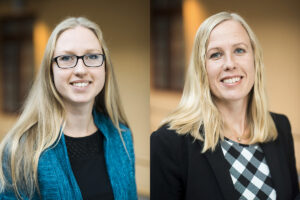The Företagsforskarskolor Innofacture was run jointly by Mälardalen University and some of Sweden’s biggest manufacturing firms. When the project ended in 2021 it had led to more Industrial Graduate Schools being set up and strengthened the academic environment. At the same time, the industrial graduate students have improved production systems and introduced a sustainability mindset in manufacturing.
PhD students boost Swedish manufacturing

Innofacture started in 2012 with 15 doctoral students at what was then the university college of Mälardalen, in partnership with companies that included Volvo, ABB and Scania, and with funding from the Knowledge Foundation. In 2014 another five doctoral students were added to Innofacture+.
“There was an interest from both academia and the companies in starting a joint project. It ended up being innovative production development where we had done a lot of research and the companies needed new expertise,” says project manager Anna Granlund at the School of Innovation, Design and Engineering at Mälardalen University.
Design and innovative production development
The focus of the research has mainly been on design of and change in production systems, innovative production development, industrialisation of new products and sustainable production and manufacture.
“The companies have transformed themselves and changed both the manufacturing process itself and their products. For example, Scania has developed its working methods and its design of solutions for cooperation between humans and robots,” says Anna Granlund, listing some of the results of the school.
Successful industrial graduate students
Anna Granlund adds that Innofacture was also hugely important for the university. This is partly due to new research in the form of 234 scientific publications, and partly to the fact that 17 people from the group have gained PhDs or are expected to do so shortly while the remaining three have gained licentiate degrees.
“Industrial graduate students have a good insight into the problems faced by the companies while also having cutting-edge expertise in the research domain. On top of that, they have been good for the first-cycle programme as guest lecturers at the university and have initiated thesis projects in their companies. They have really been a bridge between industry and academia,” says Anna Granlund.
Innofacture ended in 2021 and has produced ripple effects in the form of two new Industrial Graduate Schools, Array and Indtech. The focus is now directed even more towards automation, digitalisation and what is termed industry 4.0, or the fourth industrial revolution.
“Innofacture has produced spinoffs and generated greater knowledge about these questions while also helping to boost Swedish manufacturing,” says Anna Granlund.
Important to define problems together
One of the industrial graduate students is Anna Sannö, now head of research strategy at Volvo Construction Equipment, where she also wrote her thesis on sustainability in production.
“As an industrial PhD student, you take a more pragmatic approach to the problems you tackle. You also gain a different understanding of the complexity of an organisation. We were able to test the research questions in reality, instead of sitting in a university and creating models that might not actually work on the ground,” she says.
Co-production, in other words academia and the business sector jointly identifying and working on a research question, is not without its challenges, though. One challenge lies in generating trust on the part of industry so that research can progress.
“Another challenge is that the focus is on day-to-day work on the ground. Working in industry, it’s often important to find quick solutions. You need to find a good, shared definition of the problem and make a precise plan,” says Anna Sannö.
Co-production a recipe for success
In her current role, Anna is working to bring even more research into Volvo Construction Equipment, including by running webinars with different researchers.
“Co-production is a successful concept! We see many advantages from having students and researchers on the spot to solve problems, such as in our Factory 4 tomorrow initiative.” And she saw for herself that research can lead to concrete results during her own doctoral studies.
“What I’m proudest of is that I helped Volvo CE’s paint shops, including in Hallsberg, by converting their manufacturing process to make it more sustainable. Today they have four people on site doing thesis projects and are genuinely actively seeking new knowledge in collaboration with several universities,” Anna Sannö concludes.
This article was also published in the Knowledge Foundation’s annual report 2021.

